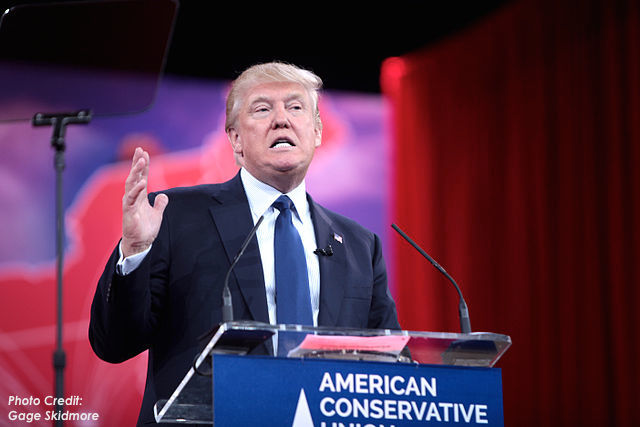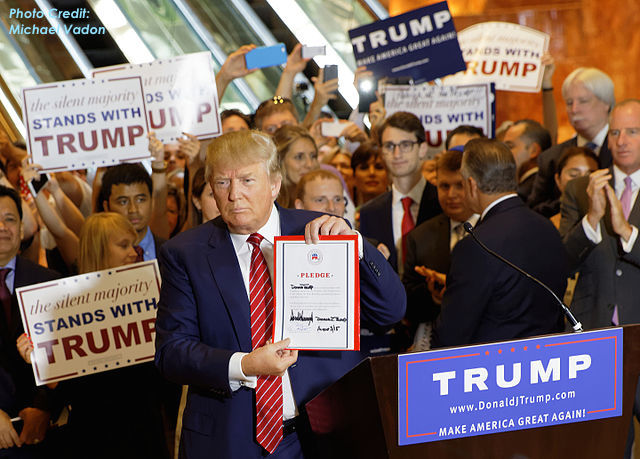“Don’t worry,” says Donald Trump. “When I said we’d look into ways to ‘get rid of them,’ I didn’t mean Muslims! I just meant the hypothetical Muslim training camps believed in by the obvious racist whose insane opinions I treated as valid.”
Tag Archives: Donald Trump
Procedurally, GOP nomination is within Trump’s reach

“Party Rules to Streamline Race May Backfire for G.O.P.” – New York Times:
In the starkest sign of how unsettled the situation is, what once seemed unthinkable — that Mr. Trump could win the Republican nomination — is being treated by many within the Republican establishment as a serious possibility. And one reason his candidacy seems strong is a change by the party in hopes of ending the process earlier: making it possible for states to hold contests in which the winner receives all the delegates, rather than a share based on the vote, starting March 15, two weeks earlier than in the last cycle. Ten states have said they will do so.
If Mr. Trump draws one-third of the Republican primary vote, as recent polls suggest he will, that could be enough to win in a crowded field. […] With 15 candidates in the field, and Mr. Trump at the center of the action, the debates have become ratings bonanzas for the networks and drawn record-setting viewership. And many states, eager to play a more influential role, seized the opportunity to schedule their nominating contests earlier. Eight states in the conservative-dominated South, where insurgent candidates like Mr. Trump could do well, have created a Super Tuesday on March 1, when delegates must still be awarded proportionally.
[…]
After March 15, he could begin amassing all the delegates in a given state even if he carried it with only a third of the vote. And the later it gets, the harder it becomes for a lead in delegates to be overcome, with fewer state contests remaining in which trailing candidates can attempt comebacks.
This is why it’s always important to know and understand the rules for how delegates will be awarded. Steve Schmidt acknowledges that in the article:
“There is a bubble of delusion among Republicans and Democrats in Washington, D.C., with regard to their parties’ respective nominating processes,” Mr. Schmidt said. “There is no magic date upon which the air will come out of the Donald Trump balloon. The notion that Donald Trump cannot be the Republican nominee is completely and totally wrong.”
It’s worth recalling that one of the collapse factors during the 2008 Hillary Clinton campaign was due to her campaign advisers mistakenly believing delegates would be awarded differently, in her favor, early in the cycle, even if she stumbled in one or two of the early states. (Not that they expected that either, which may be why they didn’t study the rules carefully…)
Troubling
I know we’re not supposed to compare people to Hitler.
But like…
when a big populist candidate says “we’re going to be looking into that”
in response to a voter asking when we can “get rid of”
a religious minority of 2.75 million people (80% of whom are citizens)
that the voter believes “want to kill us”…
it’s pretty hard not to think about how 2.96 million Jewish people in Poland in 1933 weren’t there anymore in 1950.
Trump reassures supporter that he'll be looking into getting rid of all the Muslims in the United States: pic.twitter.com/geo3oxsV6G
— Angelo Carusone (@GoAngelo) September 17, 2015
Sept 9, 2015 – Arsenal For Democracy 142
Posted by Bill on behalf of the team.

Topics: Are Blairites and Clintonites right about the center-left? What lessons can be learned from the 1820s and 1830s in US politics? Understanding the Trump bankruptcies better. People: Bill, Nate. Produced: September 6th, 2015.
Episode 142 (51 min):
AFD 142
Discussion Points:
– Corbyn and Sanders: Are centrist Blairites and Clintonites right about the left?
– US history: What lessons can be learned from the 1820s and 1830s in US politics?
– Trump bankruptcies: Not as negative as widely suggested? We compare and contrast.
Related Links
– AFD: “The Only Way is Blair”
– AFD: “When The Party’s Over: The 1820s in US Politics”
– AFD: “Op-Ed | Trump’s Bankruptcies in Perspective”
Subscribe
RSS Feed: Arsenal for Democracy Feedburner
iTunes Store Link: “Arsenal for Democracy by Bill Humphrey”
And don’t forget to check out The Digitized Ramblings of an 8-Bit Animal, the video game blog of our announcer, Justin.
Podcast: Play in new window | Download
Subscribe: RSS
Prophecies from the Oracle of Miami
Jeb Bush attacking Donald Trump in Spanish sounds like the second act of a Greek tragedy where your specific efforts to avert a prophecy make it come to pass.
Op-Ed | Trump’s Bankruptcies In Perspective
The following op-ed originally appeared in The Globalist.
U.S. presidential candidate Donald Trump has publicly described his business empire’s four bankruptcies in the following terms: “I have used the laws of this country…the [bankruptcy] chapter laws, to do a great job for my company, for myself, for my employees, for my family.”
Because his businesses entered “Chapter 11” bankruptcies – named for the provision of the U.S. legal code that allows businesses to restructure without closing shop and liquidating – he sees the four episodes in utilitarian and strategic terms, not as failures.
While I am not defending Donald Trump’s view of his practices, one key question needs to be answered: Are Trump’s business bankruptcies really worse than other corporate legal manipulations and practices?
Gaming the system
True, Chapter 11 bankruptcy is uncommon by comparison to other maneuvers through American business and tax law. Certainly bankruptcy still carries a bit of a scarlet letter stigma even if the risk is somewhat controlled, and so it is generally avoided.
But is manipulating corporate bankruptcy law really worse than those other tactics? Major U.S. companies use and abuse legal provisions constantly to evade and avoid taxes to the government.
Trump, by contrast, used the law to avoid creditors at major investment banks and funds (and most of them came out the other side of his restructurings with lucrative deals).
Some U.S. companies do complicated maneuvers like “offshore reincorporation” and other tax-avoidance mergers – a loophole Trump has actually criticized on the campaign trail.
The entertainment mogul used Chapter 11 for cashflow management purposes (and to slash hundreds of millions of dollars in company debts). If companies use the U.S. legal code to boost their profits and cashflow via tax avoidance, how is that less dubious than using Chapter 11 bankruptcy?
Donald Trump made business deals on the (correct) assumption that he could fall back on restructuring laws. Other firms make deals based on assumptions that they can fall back on tax loopholes.
Firm defenders of American business law might dismiss the existence of business law loopholes as irrelevant either way and might prefer to judge his record solely on what these bankruptcies says about his ability to run businesses responsibly.
Poor financial management
Well, what about comparing it to popular and trendy legal maneuvers that are questionable long-term business practices? Many U.S. companies have been borrowing heavily to reward their shareholders, instead of using it to invest in expansion.
This practice effectively means shareholders are profiting against the company’s future financial health, rather than from current (or future) returns on its previous (or current) investments. That means literally raiding the companies’ future earnings to generate payout cash now.
Such a company will eventually have to pay back the borrowed money with interest. In the meantime, it will not have gained anything from that borrowing because it was used to rain money down on shareholders instead of actually growing the company’s operations.
The vast majority of American stock is held by a very small number of people with a lot of money to throw around. This means companies are putting themselves deeper into a long-term hole, even as wealthy shareholders rake in money in the short-term.
Trump may be incorrect when he asserts that “virtually every person” at the top of the business world has made use of bankruptcy protections. But his claim might simply be a bit ahead of its time – given the short-termist (mis)management of so many major U.S. companies today.
Down the line, by borrowing to benefit shareholders, a lot of American companies could have very high debt burdens. They would also be very underdeveloped compared to foreign competitors who invested in keeping up with the times and growing their long-term potential earnings.
That will make them uncompetitive, as well as vulnerable to bankruptcy or Japanese-style zombification.
And even all of this is to say nothing of the Wall Street debacles in 2008 that would have forced massive bankruptcies were it not for backstop loans by the Federal government.
Trump, business law exploitation pioneer
Sure, Donald Trump flew closer to the sun (and did so sooner) than these other future Icaruses, but the effect may eventually be the same. Singling him out would be mistaken, if not hypocritical.
Once again, as with his xenophobic appeals, one finds that Trump is merely reflecting back a refined and purified vision of what America has become in its re-expanding dark corners – in this case corporate America and the wealthiest 1%.
Those corners of our society exercise financial and political power in a dangerous direction. But he did not make it that way, and he is not the exception.
There is a separate set of rules in the United States accessible only to the very wealthy and their mega-corporations that allows them to evade and avoid debts and taxes that are seemingly inescapable for average Americans.
That lack of fairness in the rules is undermining voter confidence in the political and economic governance system. Ironically (and worryingly), that mix of frustration and apathetic helplessness has created the opening for someone like Trump to step into the breach.
The tax policy of Trumponomics
A recent New York Times headline blared “Republicans Wary of Donald Trump’s Populist Tone on Taxes.”
On the one hand, this development is hilarious because he’s slamming a huge wedge into the Republican Party. On the other hand, oddly enough some (though not all!) of these tax proposals are pretty legit, at least in theory.
He has threatened to increase taxes on the compensation of hedge fund managers. And he has vowed to change laws that allow American companies to benefit from cheaper tax rates by using mergers to base their operations outside the United States.
[…]
“The one problem I have with the flat tax is that rich people are paying the same as people that are making very little money,” Mr. Trump said. “And I think there should be a graduation of some kind.”
Implementing his “ideas” is of course another matter, and he would undoubtedly do that wrong if he were actually to become president.
Previously on AFD on this topic:
– Op-Ed (for The Globalist) | Pfizer: Tax havens or bust!
– Treasury Dept acts to discourage tax avoidance mergers
– Are Trump’s bankruptcies worse than other business law manipulations?




